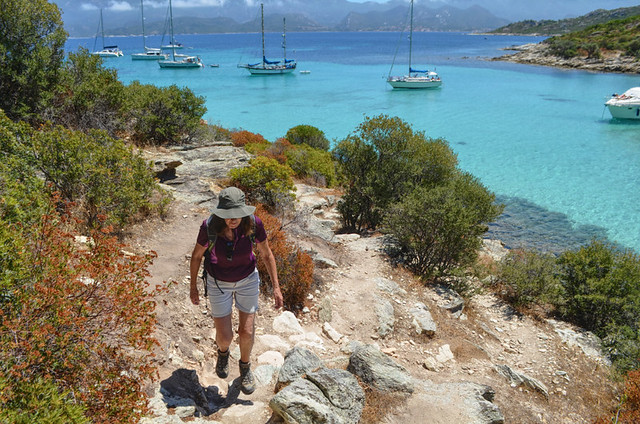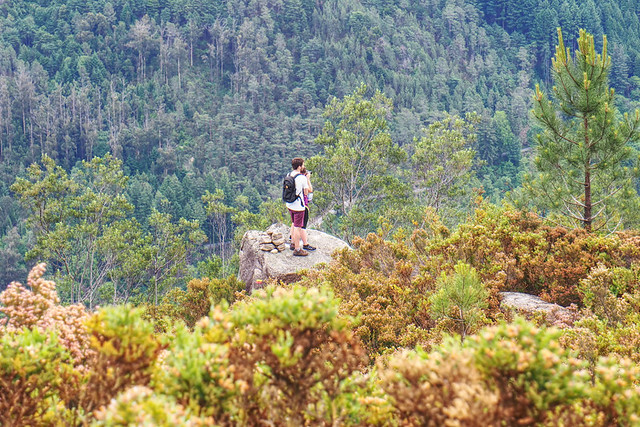There’s a question to do with outside leisure that pops up every now and again, and which has some people involved in the activity pondering, maybe even as they yomp (another term thrown into the pot just to be contrary) through glen and vale. What is the difference between walking and hiking?
Definitions
The first place to start when trying to get to the bottom of the meaning of individual words is to look up their definition in a dictionary. Different ones throw up slightly definitions but they all basically mean the same.
Walking: to move along on foot.
Hiking: the activity of going for a long walk especially for pleasure or exercise.
Therefore, all hiking involves walking but not all walking involves hiking.
However, walking is also commonly used to determine long walks in the countryside for pleasure or exercise. Search Google for ‘walking holidays’ and there are 104,000,000 results.
How do others define the difference between walking and hiking?
The adventure website Trails and Summit come up on the zero-ranking position for the question ‘what is the difference between walking and hiking?’
This is their take on it: ‘Walking is typically a casual activity done in a more urban environment or on a road/sidewalk. Hiking is better defined by taking to the trails and being out to immerse yourself more deeply in nature.’
A CNN article states: ‘Walking is generally an exercise that you do outside in an urban or suburban setting, or indoors in a gym on a track or treadmill. Hiking, in contrast, is walking that’s done in the outdoors and along natural terrain. You’ll usually encounter elevation changes when hiking, but not necessarily when walking.’
I don’t fully subscribe to either as I believe you can go for a walk in the countryside that isn’t necessarily a hike. And as for no elevation changes when walking? That just doesn’t make any sense.
There’s also cultural interpretation at play in both above.
What if you put the question out to the public? Using sites with user generated content often results in ‘interesting’ answers.
This is how the top answer on the Q&A website Quora defined the difference between hiking and walking: ‘To me, and in the UK, nothing really, they are pretty much interchangeable. Hiking slightly conjures up images of red hand knitted socks and corduroy britches.’
This answer was supplied by somebody called Mike in the UK. It also revealed cultural bias.
I’d go along with his comment that, in the UK, hiking and walking are pretty much interchangeable.
We’ve been writing walking/hiking route directions for years, as well as penning numerous articles about the activity. Sometimes we’ll use hiking and sometimes we’ll use walking when referring to the same activity. But we’re British, and that does make a difference.
Putting together Slow Travel holidays for specialist Inntravel, and producing our own walking guidebooks for Tenerife, we’ve walked more in Europe than we have in Britain and, subsequently, have a wider view on the profile of who walks/hikes. Mike’s comment about ‘images of red hand knitted socks and corduroy britches’ shows the perception of who goes walking/hiking in the UK.
When walking in other countries around Europe we see far less of a demographic split in who we encounter on the path. There’s been a perception in the UK that walking/hiking is something older people do. That’s simply not the same in other parts of Europe.
But it is slowly changing. Younger people in Britain are increasingly discovering the joy of being in the countryside on foot, and that in itself is impacting on the use of the terms ‘walking’ and ‘hiking’, as illustrated in this Guardian article. It starts with the quote ‘Walkers are middle aged, hikers are cool’ followed by the sub headline ‘No longer just an activity for older people with sticks, rambling in the countryside is catching on with a new generation’ which in itself reveals the UK’s walking profile bias.
Anecdotal evidence does point to the use of ‘hiking’ in social media being because it sounds cooler than ‘walking.’ A hiking Facebook group I’m in regularly features images of young women (mostly), not a hair out of place, not in the slightest bit sweaty, and dressed as if ready for a magazine shoot, standing in some spectacular spot. If they hiked/walked any distance to get to these spots, then I’ll be a monkey’s uncle.
Increasingly, hiking is used to describe short walks as well as long ones. Basically, it sounds sexier.
Cultural differences
Added to this are other cultural differences, such as in interpretation of the terms in the UK and US. A blog on the US active vacations website Pure Adventures sets out these differences quite well: ‘In North America, we tend to use “walk” in the same way we’d use “stroll” – a relatively easy excursion, usually along paved roads. We reserve the term “hike” for a more challenging trek through rugged terrain. The UK and the Republic of Ireland, however, use “walk” to describe any trip on foot, whether it’s to the corner shop or up the mountainside.
But in the end, does any of this really matter?
If anyone wants to use hiking rather than walking because they think it sounds sexier, even though they’ve only walked along a flat path for 500m to a viewpoint, so what? It doesn’t hurt anyone.
It’s only questionable if they use the term to deceive – i.e. to give the impression they walk/hike longer trails for financial gain like sponsorship, advertising, free equipment and clothing, or complimentary trips etc.
But there can be reasons where using walking or hiking does matter, and that’s when you are involved in the hiking/walking business and are aiming at specific markets.
In online search terms, the phrase ‘walking holiday’ outperforms ‘hiking holiday’ by ten to one in the UK. In the US it’s different, but even there, ‘walking holiday’ is used around three times more than ‘hiking holiday.’
Change the search term to ‘best places for walking’ and ‘best places for hiking,’ and it’s a different story. In the US, ‘hiking’ outperforms ‘walking’ in this instance. In the UK, ‘walking’ still comes tops, but the gap is closer, non-existent at times.
Based on other evidence around travel patterns, that suggests demographic differences – older walkers/hikers who use ‘walking’ looking for pre-packaged holidays; younger ones, who favour the use of ‘hiking,’ looking for more independent travel.
Ultimately, unless for business reasons, use whatever term you want to describe what you do when you put one foot in front of another in nature’s playground and don’t sweat it.
That would be literally don’t sweat it if your hikes tend to be only couple of kilometres on a defined flat path.










Be the first to comment